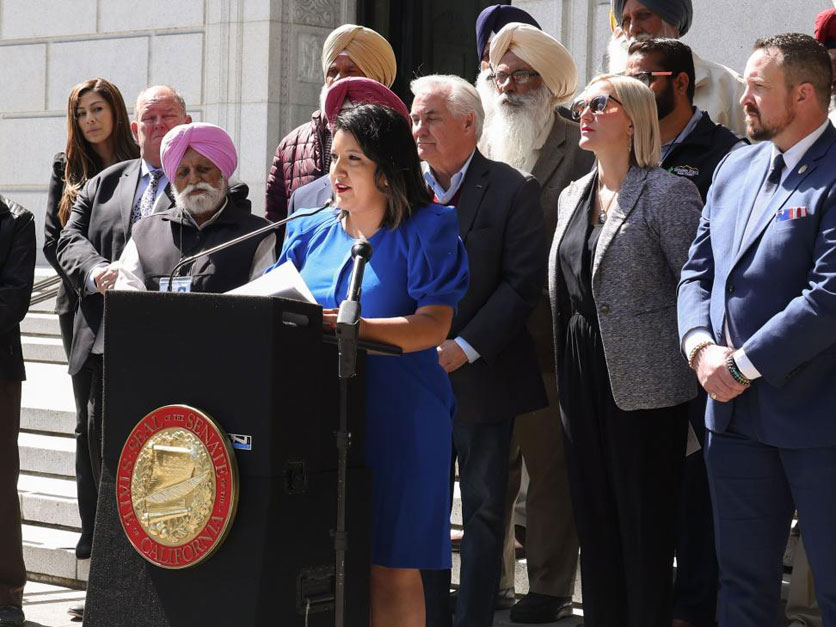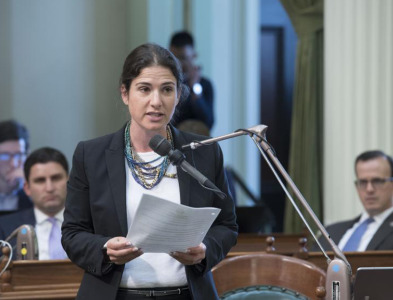Ahead of a legislative deadline on Friday, lawmakers filed about 2,600 new bills—the most in more than a decade. The active session to come is shaping up to deliver many new challenges for farmers already dealing with water shortages, rising taxes and soaring labor costs.
One of the most active lawmakers in the agriculture arena is state Sen. Melissa Hurtado, who narrowly won a new Bakersfield district last year and now chairs the Agriculture Committee. Hurtado has returned to an effort to bar foreign governments from purchasing farmland in California and has added another bill that seeks more transparency on foreign-owned shell companies.
Tulare County farmer John Werner testified in support of her measure last year, arguing rural small farmers “simply can't compete with the power of foreign investors for that scarce resource of water.” But Gov. Gavin Newsom vetoed the measure, reasoning that in light of a potential recession, the bill would have created “new and arduous responsibilities” for CDFA and added data reporting that is outside the department’s purview.
“We must secure our food systems,” Hurtado said in reviving the measure. “But in order to do so, we need to have a better understanding of the role foreign-owned governments may play in our energy and water facilities and agricultural land.”
Hurtado has also reintroduced a measure offering supplemental pay to farmworkers who have lost income due to drought. Her bill last year initially proposed to pay agricultural workers $1,000 per month for three years, though that provision fell by the wayside to pass through an appropriations committee. Newsom vetoed that bill as well and pointed out that the state was investing $35 million for a separate five-year pilot program experimenting with guaranteed income.
With increasing water scarcity in the San Joaquin Valley, Hurtado also is proposing to ensure state agencies update their forecasting models for atmospheric rivers to capture more runoff in reservoirs and to account for California’s persistent drought in their modeling.
Last year, Hurtado took an aggressive stance with the State Water Resources Control Board with a bill seeking to dissolve the agency. This year, she was the first of several politicians to blast endangered species regulations for restricting Delta pumping operations as a surge of water flowed out to sea. She followed up her letter to the Newsom administration with a bill that would require the Department of Fish and Wildlife to base such decisions on real-time monitoring of sensitive fish populations.
Sen. Anna Caballero of Merced, a fellow moderate Democrat who once chaired the Assembly Agriculture Committee, is hoping to relieve some of the state’s persistent drought issues by establishing long-term water supply targets. Like many bills at this point in the legislative calendar, hers is light on details. But it calls for more reliability in the water supply for agriculture, cities and the environment to build climate resilience.
 Sen. Melissa Hurtado, D-Bakersfield
Sen. Melissa Hurtado, D-BakersfieldA powerful urban lawmaker who often stands at opposite ends on the policy spectrum from agriculture has begun the year with a series of ambitious bills as well. Assemblymember Rebecca Bauer-Kahan of Orinda chairs the Water, Parks and Wildlife Committee and has set new initiatives for protecting water supplies and pollinators.
She hopes to ramp up enforcement authority for the state water board. Under AB 460 the board could fine a water user up to $10,000 a day for violating an order to cease diversions. A competing bill proposes to fine violators $500 a day instead.
The Planning and Conservation League recommended such interim relief orders last year. The environmental group assembled a team of law scholars to develop several proposals for overhauling California’s system for water rights. Two bills resulted from the report but failed to pass in the last session.
“We do not have the regulatory tools to handle the new normal of megadrought,” said Bauer-Kahan on the new bill. “Ongoing illegal or wasteful water use practices can become the difference between access to water or dry taps in the future.”
Last year the board fined a group of Siskiyou County ranchers $4,000 for violating curtailment orders and received widespread criticism for not taking immediate enforcement action.
Newsom is in alignment with the Planning and Conservation League as well. Last week he extended a controversial executive order requiring groundwater sustainability agencies to review well permit applications prior to county approvals—a recommendation that extends from the environmental group’s report. The aim is to protect vulnerable drinking water wells, but farm groups have argued the action just adds confusion and delays permitting. Last year the Legislature shot down a measure to codify into state law Newsom’s order.
Along the same vein, Asm. Lori Wilson of Suisun City has introduced a measure that would task courts with a bigger role in adjudicating groundwater basins by requiring farmers to monitor their pumping to protect nearby wells.
Don’t miss a beat! It’s easy to sign up for a FREE month of Agri-Pulse news! For the latest on what’s happening in Washington, D.C. and around the country in agriculture, just click here.
Seeking to protect farmers, on the other hand, Republican Sen. Brian Dahle, who hosts Folsom, Oroville and Shasta lakes in his district, has brought forward legislation to streamline the process for approving storage projects like the proposed Sites Reservoir.
Similarly frustrated with lagging infrastructure investments, Asm. Carlos Villapudua of Stockton is pressing colleagues to approve a flood bond for the 2024 ballot to “correct the historical lack of funding for flood protections in the San Joaquin Valley.”
Four senators are also proposing a sprawling $4.1 billion resources bond to finance various projects to help the state adapt to climate extremes. It would fund programs to protect the water supply along, provide drought relief and support climate-smart agriculture practices. It also has a provision for establishing a water trust, a concept that drew skepticism last year when the administration proposed such an approach for buying water rights to restore ecosystems. Two other senators are proposing a climate and flood bond of roughly the same amount.
For those lands that will go permanently fallow due to drought or groundwater regulations, two bills are hoping to incentivize solar development on those properties.
Water quality will be an issue in the legislature this year as well. Bauer-Kahan is considering ways to restrict products that can leach plastics into watersheds. While her bill would specifically ban certain cosmetics, detergents, waxes and polishes, farm groups are worried about restrictions on using tarps, since the Department of Pesticide Regulation (DPR) is pressing growers to use the impermeable barriers more often.
Crop protection tools, H-2A rules also in play
Bauer-Kahan has revived a proposal to ban backyard neonicotinoids. Newsom rejected her bill last year to prohibit the use of neonics on landscapes and gardens. Last month DPR unveiled an ambitious roadmap for banning controversial pesticides by 2050 and Bauer-Kahan is seeking to extend the stakeholder workgroup that helped craft the plan.
 Asm. Rebecca Bauer-Kahan, D-Orinda
Asm. Rebecca Bauer-Kahan, D-OrindaAsm. Alex Lee of San Jose, another progressive urban Democrat, is proposing an environmental justice advisory committee at DPR. According to Lee, the committee would make recommendations for reducing racial and socioeconomic disparities from the impacts of pesticide exposure. Californians for Pesticide Reform and the Pesticide Action Network are supporting the bill.
“With California accounting for more than 20% of the total national pesticide use, this is long overdue,” said Lee in a statement.
Similarly, Sen. John Laird of Santa Cruz is targeting CDFA’s existing pest control advisory committee and wants to add two members of the general public to the group of agricultural advisors.
With California agriculture facing so many regulatory hurdles already, Asm. Eduardo Garcia of the Coachella Valley has revived a proposal to apply California’s environmental and labor standards to imports. The bill would not impose fees on out-of-state producers and instead require them to submit a form self-attesting compliance with California’s codes.
California also imports many farmworkers, and Asm. Ash Kalra of San Jose is carrying the torch again this year on a bill that would add new regulations for H-2A guestworkers. Assembly Bill 636 would require, among several other provisions, that employers pay salaries for travel time to work sites. Kalra championed the legislation last year after the previous author termed out of office. Newsom vetoed it just before approving a controversial measure on card check.
Despite the flurry of activity in printing new legislation this month, more than 1,000 bills have been introduced as placeholders to be filled out with policy language later in the session. The Legislature is also infamous for cannibalizing bills to pass last-minute legislation and for slipping ambitious proposals within lengthy budget trailer bills, since lawmakers and the public have little capacity for scrutinizing the many provisions.
The deadline for new bills is the starting gun that sets off a marathon of policy activity over the coming months. Committees will race through policy debates, as lobbyists jostle for compromises and clarifying amendments.
For more news, go to www.Agri-Pulse.com.


